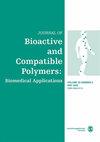芦荟-海藻酸盐水凝胶治疗宫颈癌的物理力学和体外分析
IF 2.1
4区 生物学
Q3 BIOTECHNOLOGY & APPLIED MICROBIOLOGY
引用次数: 0
摘要
世界范围内女性的主要癌症诊断是宫颈癌,目前的治疗方法都有严重副作用的风险。毒性较低但有效的治疗方法受到追捧。芦荟(barbadensis miller)以其有益的特性而闻名,已被研究用于癌症治疗。虽然芦荟凝胶已被证明具有抗癌活性,但它不能单独形成水凝胶。因此,由海藻酸盐与芦荟混合组成的互穿网络作为宫颈癌治疗进行了研究。我们假设芦荟凝胶的抗氧化特性会降低癌细胞的活力,而海藻酸盐水凝胶会改善黏附。我们进一步假设芦荟凝胶的抗氧化活性会在与普通化疗药物相似的水平上诱导癌细胞死亡,并旨在确定这些化疗行为是建设性的还是破坏性的。研究并验证了材料和粘附性能、药物包封性和癌细胞活力。芦荟-海藻酸盐水凝胶对宫颈癌细胞活力的影响与含有阿霉素(DOX)的芦荟混合物相比没有显著差异,这表明芦荟单独降低了癌细胞活力,使得额外的细胞毒性治疗作为辅助治疗不起作用。这项研究提供了对天然生物聚合物治疗宫颈癌的潜力的见解,而不含全身毒性化合物。本文章由计算机程序翻译,如有差异,请以英文原文为准。
Physico-mechanical and ex vivo analysis of aloe-alginate hydrogels for cervical cancer treatment
A leading cancer diagnosis in women worldwide is cervical cancer, with current treatments all posing a risk of serious side effects. Less toxic, but effective treatments are sought after. Aloe vera (barbadensis miller), known for its beneficial properties, has been studied for cancer treatment. While aloe gel has been shown to exhibit anti-cancer activity, it cannot form a hydrogel alone. Therefore, an interpenetrating network comprising alginate blended with aloe was examined as a cervical cancer treatment. We hypothesized the antioxidant properties of aloe gel would decrease cancer cell viability while the alginate hydrogel would improve mucoadhesion. We further hypothesized the antioxidant activity of aloe gel would induce cancer cell death at levels similar to common chemotherapeutics, and aimed to determine if these chemotherapeutic behaviors are constructive or destructive. Material and adhesive properties, drug encapsulation, and cancer cell viability were investigated and validated. The effect of aloe-alginate hydrogels on cervical cancer cell viability was not significantly different compared to aloe-blends containing doxorubicin (DOX), indicating that the aloe alone decreased cancer cell viability rendering the additional cytotoxic therapeutic not impactful as an adjuvant therapy. This study provides insight into the potential of natural biopolymers for treating cervical cancer without systemic toxic compounds.
求助全文
通过发布文献求助,成功后即可免费获取论文全文。
去求助
来源期刊

Journal of Bioactive and Compatible Polymers
工程技术-材料科学:生物材料
CiteScore
3.50
自引率
0.00%
发文量
27
审稿时长
2 months
期刊介绍:
The use and importance of biomedical polymers, especially in pharmacology, is growing rapidly. The Journal of Bioactive and Compatible Polymers is a fully peer-reviewed scholarly journal that provides biomedical polymer scientists and researchers with new information on important advances in this field. Examples of specific areas of interest to the journal include: polymeric drugs and drug design; polymeric functionalization and structures related to biological activity or compatibility; natural polymer modification to achieve specific biological activity or compatibility; enzyme modelling by polymers; membranes for biological use; liposome stabilization and cell modeling. This journal is a member of the Committee on Publication Ethics (COPE).
 求助内容:
求助内容: 应助结果提醒方式:
应助结果提醒方式:


